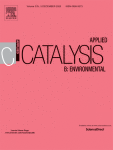|
Authors
Qian, Lin; Georgi, Anett; Gonzalez-Olmos, Rafael ; Kopinke, Frank-Dieter ; Kopinke, Frank-Dieter
|
Abstract
Perfluorooctanoic acid (PFOA) is of emerging concern owing to its global distribution and environmental persistence. Efficient degradation approaches are so far limited. Herein, we demonstrate for the first time the photochemical degradation of PFOA under UV-A irradiation after adsorption on Fe-doped zeolites with molecular oxygen as the terminal oxidant. In a system containing 1 g L−1 PFOA-loaded Fe-zeolites, outstanding PFOA decomposition (> 99 %) was achieved within 24 h under slightly acidic conditions (pH ≤ 5.5). Short-chain perfluorinated carboxylic acids (PFCAs) are the main intermediates, beside fluoride and CO2. No PFOA degradation occurs with Fe-free zeolites or dissolved ferric ions. Furthermore, we investigated the effects of pH, inorganic ions and gas atmospheres on PFOA degradation. A photochemical degradation mechanism with zeolite-bound iron species as catalytic sites for carboxylate-to-metal charge transfer is proposed. The presented study offers a novel approach for the removal of the highly recalcitrant PFOA from contaminated waters.
|

WoS
Scopus
Altmetrics
 
|
